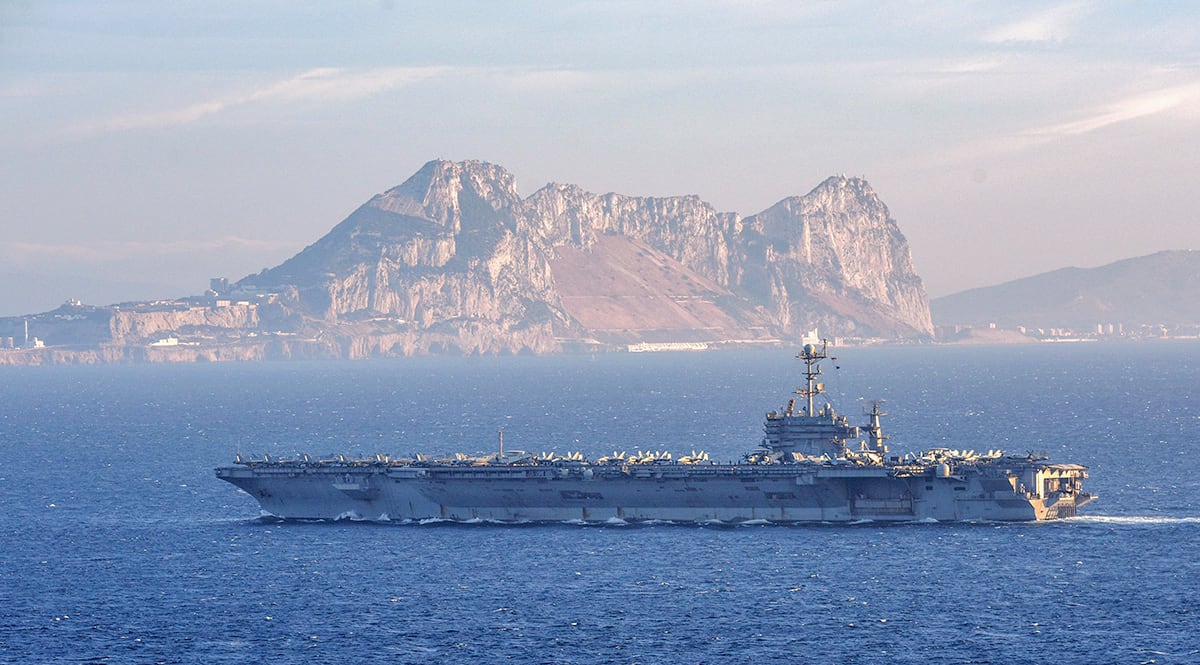As U.S. Navy brass continues to sound the alarm about Russian submarine activity in the North Atlantic, the sea service kicked off an exercise this week to hone the sort of anti-sub warfare skills that fell by the wayside in the post-9/11 world.
Dubbed “Exercise Black Widow 2020” for a reason several admirals could not explain to reporters Wednesday, the six-day North Atlantic training event kicked off Monday and involves the amphibious assault ship Wasp, the warships Arleigh Burke and McFaul, two fast-attack subs, P-8 Poseidon sub-hunting aircraft and two helicopter strike maritime squadrons.
Black Widow is part of an effort to ensure the service is ready to fight enemy subs, regardless of the Navy platform, U.S. 2nd Fleet commander Vice Adm. Andrew Lewis told reporters Wednesday.
Playing the role of the undersea bad guys are members of the Navy’s undersea aggressor squadron, or AGGRON, a unit stood up last year to educate deploying crews and play the enemy elsewhere in the water column.
Battling enemy subs fell down the list of priorities during the past two decades, when the wars in Iraq and Afghanistan, and against asymmetric terrorism, took precedence.
RELATED

But now, with Moscow and Beijing prowling the so-called “High North,” re-sharpening such skills has taken on a renewed urgency.
“This is where the fight is … where the competition is,” Lewis said. “Specifically in the Atlantic, the undersea capability of the Russians. We have got to maintain that advantage.”
“We’ve got some incredible warfighters in the submarine community that have stayed on top of this, the rest of us are getting back into that,” he added.
The diverse array of surface, air and undersea units in the exercise reflects the priority the Navy is placing on making sure its sub-fighting capabilities are up to snuff, Lewis said.
“Anti-submarine warfare is a primary mission for everybody in the United States Navy, regardless of what you wear on your chest,” he said.
Navy officials have in recent years sounded the alarm about Russian sub activity near vital undersea cables in the Atlantic that are vital communications tethers between North America and Europe, among other signs they see as troubling portents in those waters.
Vice Adm. Daryl Caudle, the head of Submarine Force Atlantic, said that while Russia is a “cash-strapped nation,” they are still fielding some of the most advanced boats out there.
“Russia took a knee for over a decade and allowed a lot of folks to think the homeland is a sanctuary from Russian forces,” Caudle told reporters. “Our homeland is no longer a sanctuary. We have to be prepared to conduct high-end combat operations in local waters.”
“Nothing’s a sanctuary any longer,” he added. “That’s why we have to be ready.”
While Black Widow will allow the testing of new sensors and other gadgets, it will also test out tactics, strategies and new command and control structures for such future potentialities.
Geoff is the managing editor of Military Times, but he still loves writing stories. He covered Iraq and Afghanistan extensively and was a reporter at the Chicago Tribune. He welcomes any and all kinds of tips at geoffz@militarytimes.com.





